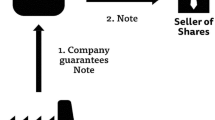Abstract
The employee owned company (EOC) might be the ideal blend of capitalism and communitarianism that vitalizes the global economy. EOCs – based on the concepts of employee participation and control – have sprung up in the United Kingdom, some parts of the European Union, the United States, Japan, and the former Eastern Bloc countries. Research has shown that they are able to compete effectively with more traditional companies. However, in addition to the pressures of business competition, EOCs face two other key problems as they strive to survive: (1) degeneration and (2) human nature and the abuse of power. After introducing the idea of the EOC and describing briefly these two key problems, this article presents seven recommendations for sustaining employee owned companies. These recommendations – grounded in sound organizational theory and the writings of experts in the field of employee ownership – are offered as hypotheses to be examined empirically by future researchers.
Similar content being viewed by others
References
Autry J. A.: 2002/2003, The Servant Leader: How to Build a Creative Team, Develop Great Morale, and Improve Bottom-Line Performance. Pastoral Forum 20(1), 1–5
Ben-Ner A., D. C. Jones (1995) Employee Participation, Ownership, and Productivity: A Theoretical Framework. Industrial Relations 34(4), 532–554
Cheney G. 2002 Values at Work: Employee Participation Meets Market Pressure at Mondragon. (Cornell University, Ithaca, NY)
Cheney G., Y. Buitrago 2002 Key Value Debates at Mondragon, In: G. Cheney (ed.) Values at Work: Employee Participation Meets Market Pressure at Mondragon (Cornell University, Ithaca, NY), pp 67–112
Cornforth C., A. Thomas, J. Lewis, R. Spear 1988 Developing Successful Cooperatives. (Sage Publications, London)
Gates G. 1998, The Ownership Solution: Toward a Shared Capitalism for the Twenty First Century. (Penguin Press, London)
Gordon J. N. 1999 Employee Stock Ownership in Economic Transition: The Case of United and the Airline Industry, In: M. Blair, M. Roe (eds.) Employees and Corporate Governance (The Brookings Institution, Washington, DC), pp 317–352
Jensen, A.: 2006, The Ethics of Ownership: The Theory and Practise of Employee Ownership (Department of Philosophy, University of Wales-Lampeter)
Knowles E. (ed.) 2004 The Oxford Dictionary of Quotations, 6th ed. (Oxford University Press, London)
Leadbeater C. 1997, A Piece of the Action (Demos, London)
Lipset S. M.: 1962, “Introduction” to Political Parties by R. Michels, Translated by E. and C. Paul. (The Free Press, New York)
Logue J., W. Patton, A. Tevdosio, K. Thomas 1998, Participatory Employee Ownership. (Kent Popular Press, Worker Ownership Institute, Kent State University, Kent, OH)
Luchte, J.: 2006, ‹The Second Mystery: The Ethos of Employee Ownership’, Appendix to A. Jensen, The Ethics of Ownership: The Theory and Practise of Employee Ownership (Department of Philosophy, University of Wales-Lampeter), pp. 123–145
MacLeod G. 1997, From Mondragon to America: Experiments in Community Economic Development (University College of Cape Breton Press, Sydney, Nova Scotia)
Magoni F.: 2002/2003, Pyramids and Paradigms. Pastoral Forum 20(1), 14
Maxey C. C. 1970, Iron Law of Oligarchy, In J. Dunner (ed.), Dictionary of Political Science (Littlefield, Adams & Co., Totowa, NJ), p. 270
Pastin M. 1986, The Hard Problems of Management: Gaining the Ethics Edge. (Jossey-Bass, San Francisco)
Pendleton, A., N. Wilson and M. Wright: 1997, The Perception and Effects of Share Ownership: Empirical Evidence from Employee Buy-Outs (Management Centre, University of Bradford)
Rothschild-Whitt J. 1979, The Collectivist Organization: An Alternative to Rational-Bureaucratic Models, American Sociological Review 44, 509–527
Sauser W. I. Jr. 2005, Ethics in Business: Answering the Call, Journal of Business Ethics 58, 345–357
Sauser W. I. Jr., R. R. Sims: 2007, Fostering an Ethical Culture for Business: The Role of HR Managers, In R.R. Sims (ed.), Human Resource Management: Contemporary Issues, Challenges and Opportunities (Information Age Publishing, Charlotte, NC), pp. 253–285
Schermerhorn J. R. Jr.: 2005, Management, 8th ed. (Wiley, New York)
Sims R. R. 2005, Restoring Ethics Consciousness to Organizations and the Workplace: Every Contemporary Leader’s Challenge, In R. R. Sims, S. A. Quatro (eds.), Leadership: Succeeding in the Private, Public, and Not-for-Profit Sectors. (M. E. Sharpe, Armonk, NY), pp. 386–407
Stephenson T. 1985, Management as a Political Activity (Macmillan, London)
Stryjan Y., A. B. Hellmark 1985, Beyond Ownership (Swedish Centre for Working Life, Sweden)
Thomas H., C. Logan 1982, Mondragon: An Economic Analysis (George Allen and Unwin, London)
Turnbull, S.: n. d., Design Criteria for Sustainable Employee Governance: To Sustain Enterprises and Society Over Changing Generations (Presentation of the International Institute for Self-governance available at http://www.aprim.net/associates/turnbull.htm)
Washington, R., C. Sutton, H. Clayton and W. Sauser: 2007, An Empirical Investigation of Relationships Between Servant Leadership and Work Attitudes (Department of Management, Auburn University, AL). Paper Presented at the Meeting of the Academy of Management, Philadelphia, PA, August
Weber, M.: 1946, From Max Weber: Essays in Sociology, Translated and Edited by H. Gerth and C. W. Mills (Oxford University Press, New York)
Whyte W. F., K. K. Whyte 1988, Making Mondragon: The Growth and Dynamics of the Worker Co-operative Complex (IRL Press, Cornell University, Ithaca, NY)
Author information
Authors and Affiliations
Corresponding author
Rights and permissions
About this article
Cite this article
Sauser, W.I. Sustaining Employee Owned Companies: Seven Recommendations. J Bus Ethics 84, 151–164 (2009). https://doi.org/10.1007/s10551-008-9679-2
Received:
Accepted:
Published:
Issue Date:
DOI: https://doi.org/10.1007/s10551-008-9679-2




